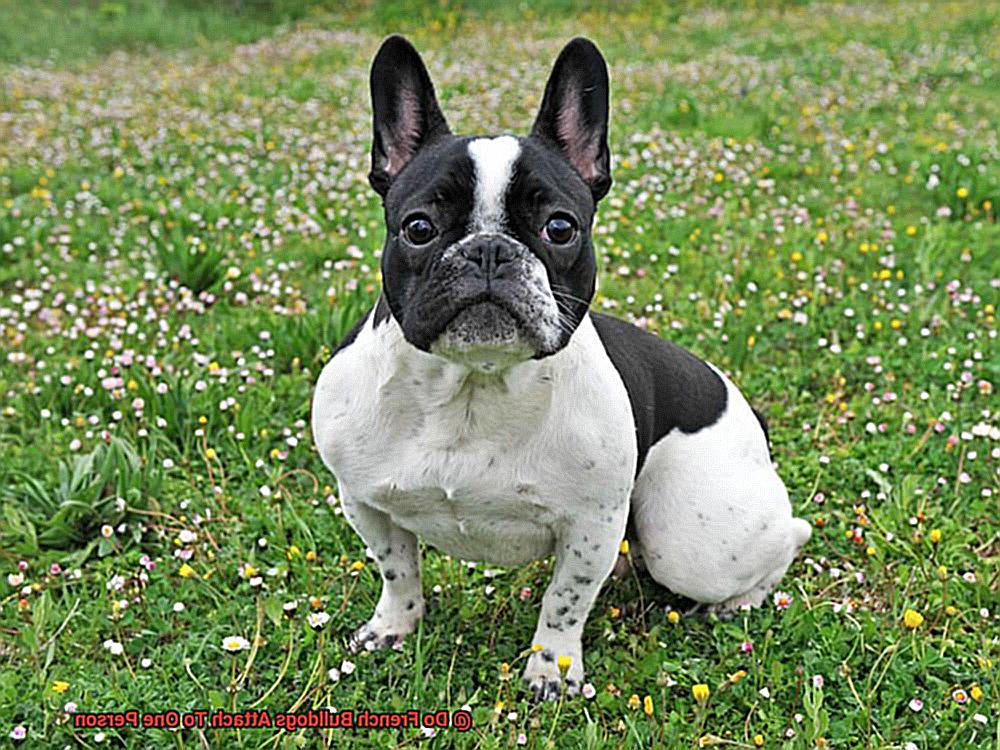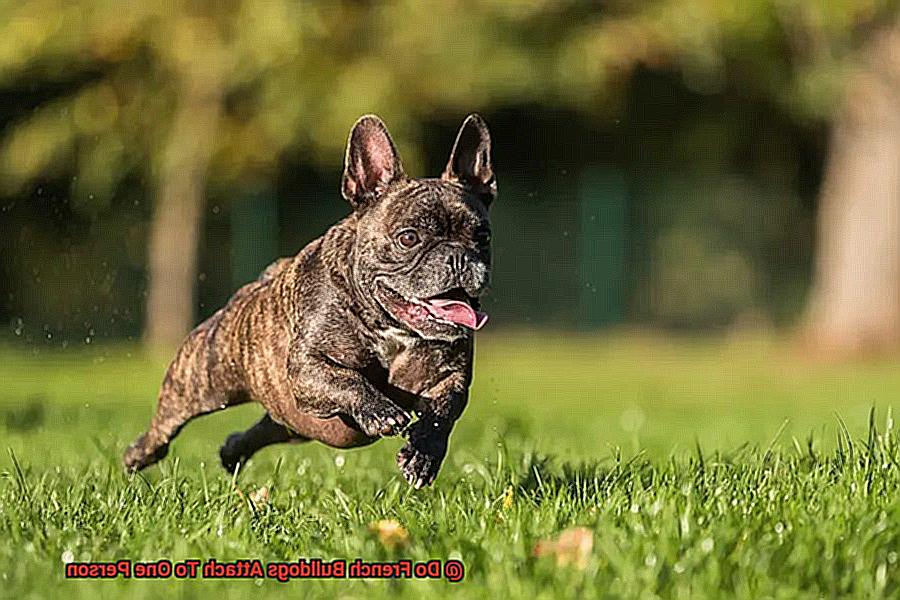Do French Bulldogs Attach To One Person?
Considering getting a French bulldog but worried they’ll become too attached to just one person?
Well, you’ve come to the right place. In this blog post, we’re diving into the captivating world of French bulldogs and shedding light on their attachment patterns.
With their adorable wrinkled faces and affectionate nature, it’s no wonder Frenchies are often labeled as “one-person dogs.” But is this belief really true?
Get ready for some fascinating insights into the world of French bulldog attachments.
What Makes French Bulldogs Attach to One Person?
Contents
- 1 What Makes French Bulldogs Attach to One Person?
- 2 Understanding the Loyal and Protective Nature of French Bulldogs
- 3 Signs of Separation Anxiety in French Bulldogs
- 4 Possessive Behavior in French Bulldogs
- 5 Forming Bonds with Other Family Members or Friends
- 6 Socialization and Positive Experiences for French Bulldogs
- 7 Training Tips for Developing Healthy Relationships with Multiple People
- 8 Conclusion
It’s not uncommon for these adorable pups to choose one person as their ultimate companion. But what factors contribute to this deep bond? In this article, we will explore the reasons behind why French Bulldogs attach to one person and how you can foster healthy relationships with other family members and friends.
Breed History and Temperament:
French Bulldogs were originally bred as companion dogs, which means they have a natural inclination to form close connections with humans. Their loving and affectionate nature makes them highly likely to attach themselves to one person. They are loyal and devoted, always craving attention and affection.
Sensitivity and Craving for Security:
French Bulldogs can be quite sensitive, which makes them seek comfort and security from their chosen person. When they receive consistent love and care from one individual, they are more likely to form a deep attachment. They become your shadow, following you around the house and showing signs of separation anxiety when apart.
Socialization and Positive Experiences:
The level of socialization a French Bulldog receives plays a crucial role in their attachment patterns. Dogs that have been well-socialized from a young age are generally more comfortable around different people and may not attach themselves as strongly to just one person. However, limited socialization or negative experiences can lead them to rely solely on their primary caregiver for security and comfort.
Building Trust Beyond One Person:
While French Bulldogs may have a preference for one person, it doesn’t mean they cannot form positive relationships with other family members or individuals they spend time with regularly. By building trust and creating positive experiences with others, you can help your French Bulldog feel more comfortable and secure in forming attachments beyond just one person.
Understanding the Loyal and Protective Nature of French Bulldogs
French Bulldogs, with their charming looks and affectionate personalities, have gained popularity as beloved family pets. One of the key traits that make them so endearing is their loyal and protective nature. In this article, we will explore how these characteristics affect their relationships with humans and why they make such wonderful companions.
Forming Strong Attachments
French Bulldogs have a history as companions and lap dogs, which has influenced their strong desire for human companionship. They thrive on attention and love being involved in their family’s daily activities. This desire for closeness often leads them to form a deep bond with one person in the household, whom they see as their primary caregiver and source of affection.
Protective Instincts
Despite their small size, French Bulldogs possess a courageous and fearless nature when it comes to protecting their loved ones. They are highly alert and attentive, always keeping an eye out for potential threats or dangers. This protective instinct further strengthens the bond between a French Bulldog and its chosen person, as they feel a strong sense of responsibility towards their well-being.
Family Relationships
While French Bulldogs may attach strongly to one person, they can still form meaningful relationships with other family members. However, their loyalty and protective instincts are often most pronounced towards their primary caregiver. It is important for all members of the household to actively engage with the dog and provide love and attention to foster healthy attachments.
Separation Anxiety
The strong attachment of French Bulldogs to one person can sometimes lead to separation anxiety when that person is not around. They may become anxious or distressed when left alone, exhibiting behaviors such as excessive barking or destructive chewing. Gradual training and desensitization techniques can help alleviate separation anxiety, ensuring that the dog feels secure even when their chosen person is not present.
Signs of Separation Anxiety in French Bulldogs
This unwavering bond can sometimes lead to separation anxiety when you’re not around. As a responsible pet parent, it’s important to recognize the signs of separation anxiety in your French Bulldog and take appropriate steps to address their distress. In this article, we’ll explore the common signs of separation anxiety in French Bulldogs, and provide tips on managing this condition to ensure your furry friend feels safe and secure.
Signs of Separation Anxiety in French Bulldogs:

- Excessive Barking or Howling: If your Frenchie barks or howls excessively when left alone, it’s a clear indication of their distress and longing for your presence. They may be trying to communicate their anxiety and call you back.
- Destructive Behavior: Chewing on furniture, shoes, or other household items is a common manifestation of separation anxiety. Your Frenchie may resort to destructive behavior as a way to alleviate stress and distract themselves from their feelings of loneliness.
- House Soiling: Even if your French Bulldog is fully house-trained, they may have accidents indoors when experiencing separation anxiety. This is often due to the anxiety causing them to lose control of their bladder or bowels.
- Restlessness and Pacing: When left alone, French Bulldogs with separation anxiety may exhibit restlessness and constant pacing around the house. They may struggle to settle down or relax without you by their side.
- Signs of Depression: Some French Bulldogs may show signs of depression when experiencing separation anxiety. Loss of appetite, decreased interest in activities, and overall sadness are common indicators that your Frenchie is feeling down due to separation.
Managing Separation Anxiety:
- Consult with Professionals: If you suspect your Frenchie has separation anxiety, seek guidance from a veterinarian or professional dog trainer who specializes in behavior issues. They can help develop a tailored plan to manage and treat the anxiety effectively.
- Gradual Desensitization: Gradually expose your Frenchie to periods of alone time, starting with short intervals and gradually increasing the duration. This process helps them build confidence and become more comfortable with being alone.
- Counterconditioning: Create positive associations with alone time by offering treats or engaging toys that your Frenchie enjoys. This technique helps change their emotional response to being alone and makes it a more positive experience.
- Provide Mental Stimulation: Leave interactive toys or puzzles for your Frenchie to engage with when you’re away. This can help keep them mentally stimulated and distracted from their anxiety.
- Medication: In severe cases, medication may be prescribed by a veterinarian to help calm your Frenchie during periods of separation. However, this should always be done under professional guidance.
Possessive Behavior in French Bulldogs
While this is certainly endearing, it can also lead to possessive behavior. In this article, we will explore the causes of possessiveness in French Bulldogs and provide expert tips on managing this behavior.
Causes of Possessive Behavior in French Bulldogs
Possessive behavior in French Bulldogs often stems from the strong bond they form with their preferred person or family member. These dogs become deeply attached to their primary caregiver, whom they view as their source of security and love. As a result, they may exhibit possessiveness as a way to protect their owner from perceived threats or competition.
Managing Possessive Behavior in French Bulldogs
- Establish Clear Boundaries: It is crucial to set clear boundaries and establish yourself as the leader. Teach your French Bulldog basic commands like “sit,” “stay,” and “leave it” to help them understand what is expected of them.
- Early Socialization and Training: Start socializing your French Bulldog from an early age. Introduce them to different people, animals, and environments to prevent them from becoming overly possessive of you or their belongings.
- Positive Reinforcement: Use positive reinforcement training techniques to reinforce good behavior and discourage possessiveness. Reward your French Bulldog with treats, praise, and playtime when they share toys or attention with others.
- Balanced Attention: Ensure that your French Bulldog receives consistent and balanced attention from all family members. This helps prevent them from becoming overly attached to one person and reinforces the idea that everyone is equally important.
- Seek Professional Guidance: If possessive behavior persists or escalates into aggression, it is advisable to seek the guidance of a professional dog trainer or behaviorist who specializes in French Bulldogs. They can provide tailored advice and techniques to address specific issues.
Forming Bonds with Other Family Members or Friends
French Bulldogs are known for their affectionate and loyal nature, making them a beloved addition to any family. While they may have a favorite person, these charming dogs can form strong bonds with multiple family members or friends. In this article, we will explore expert tips and strategies to foster these bonds and create lasting connections with your French Bulldog.
Quality Time and Activities:
Spending quality time together is crucial in building a strong bond with your French Bulldog. Engage in activities that promote trust and bonding, such as:
- Daily walks: Take turns walking your French Bulldog to ensure everyone gets one-on-one time and builds a unique connection.
- Playtime: Participate in interactive play sessions using their favorite toys or games like fetch or hide-and-seek.
- Training: Involve all family members in training sessions, reinforcing consistency and creating a sense of familiarity and authority.
Consistent Caregiving:
To establish a sense of security and stability, it is essential for everyone in the household to participate in caregiving tasks, including:
- Feeding: Rotate feeding responsibilities among family members to reinforce positive associations with different individuals.
- Grooming: Take turns brushing, bathing, and grooming your French Bulldog to create trust and comfort with various touch experiences.
Socialization Opportunities:
French Bulldogs thrive on social interaction, so make an effort to expand their circle of friends beyond the immediate family. Consider the following:
- Family gatherings: Invite extended family members or close friends over for visits, allowing your French Bulldog to interact with new faces in a familiar environment.
- Controlled introductions: When introducing new individuals, do so gradually and monitor your dog’s behavior to ensure they feel comfortable and safe.
- Playdates: Arrange playdates with other friendly dogs in controlled settings to encourage socialization skills and bonding.
Consistent Rules and Boundaries:
Establishing consistent rules and boundaries is crucial for your French Bulldog’s well-being and their ability to form strong bonds with different family members. This includes:
- Training consistency: Ensure everyone uses the same commands, rewards, and techniques to avoid confusion and reinforce a unified approach.
- Respect personal space: Teach family members to respect your French Bulldog’s boundaries when they seek alone time or rest in their designated area.
French Bulldogs are capable of forming strong bonds with multiple family members or friends if given the opportunity for positive interactions and shared experiences. By spending quality time together, participating in caregiving tasks, providing socialization opportunities, and maintaining consistent rules and boundaries, you can build lasting connections with your furry companion beyond their attachment to one person. Cherish the unique bond you create with your French Bulldog as they bring joy and love to your entire family.
Socialization and Positive Experiences for French Bulldogs
If you want to deepen your bond with your furry friend and ensure their happiness, socialization and positive experiences are the way to go. In this pawesome blog post, I will share why socialization is crucial for French Bulldogs and provide tips on creating positive experiences that will foster their attachment to humans. So grab your pup’s favorite toy and let’s dive in.
Socialization for a Well-Adjusted Frenchie:
French Bulldogs may be known for their loyalty and affection, but each dog is unique. Socialization helps shape their behavior and temperament by exposing them to different people, animals, environments, and experiences. This builds confidence, adaptability, and a positive outlook on the world.
- Meeting different people: Introduce your Frenchie to individuals of all ages and appearances, including children, adults, seniors, and people with diverse ethnicities or wearing hats, glasses, or uniforms.
- Interacting with other animals: Encourage positive interactions with dogs, cats, and even small pets like rabbits or guinea pigs under controlled circumstances.
- Exploring new environments: Take your Frenchie to parks, beaches, or busy streets to help them become familiar with various sights, sounds, and smells.
Gradual Exposure and Positive Reinforcement:
Approach socialization gradually and always reward good behavior with treats and praise. Consistency and patience are key to helping your Frenchie feel comfortable in different situations.
Creating Positive Experiences:
Beyond socialization, positive experiences further strengthen the bond between you and your French Bulldog.
- Playtime and exercise: Engage in activities that your Frenchie enjoys, such as walks or interactive play sessions. This not only provides physical exercise but also strengthens your bond.
- Training with rewards: French Bulldogs love mental stimulation. Teach them basic commands and tricks using reward-based methods, like treats or praise. This builds their confidence and reinforces their attachment to you.
Building Relationships with Others:
While French Bulldogs tend to attach strongly to one person, it’s essential for them to form positive relationships with multiple individuals. This ensures they are comfortable in various social situations and reduces separation anxiety or over-dependency.
Training Tips for Developing Healthy Relationships with Multiple People
However, it is important to foster healthy relationships with multiple people to prevent over-dependence and promote socialization skills. In this article, we will discuss training tips to help French bulldogs develop healthy relationships with multiple individuals.
Early Socialization
Start socializing your French bulldog from a young age to different people and environments. Introduce them to family members, friends, and even strangers, so they learn to feel comfortable around different individuals. This exposure helps them build confidence and prevents any potential issues that may arise from them becoming overly attached to one person.
Positive Reinforcement
Use positive reinforcement techniques to reward your French bulldog for friendly interactions with different people. Give treats, praise, and playtime when they show good behavior towards others. This helps them associate positive experiences with interacting with various individuals.
Encourage other family members or close friends to take an active role in caring for and training your French bulldog. This allows them to build their own bond with the dog and prevents over-reliance on one person. Dividing responsibilities also ensures that everyone has an opportunity to spend quality time with the dog.
Regular Outings
Take your French bulldog on regular outings where they can interact with other people in controlled environments such as dog parks or socialization classes. These outings provide opportunities for them to meet new faces and learn how to behave appropriately around different individuals.
Consistent Training
It is crucial that all individuals who interact with your French bulldog follow consistent training techniques and rules. This avoids confusion for the dog and ensures they understand what is expected of them, regardless of who they are interacting with. Consistency in training also helps reinforce boundaries and reinforces positive behaviors.
Conclusion
In conclusion, it is true that French bulldogs often form strong attachments to one person. They have a tendency to become deeply bonded with their primary caregiver and can exhibit signs of separation anxiety when separated from them. This attachment is rooted in their history as companion dogs, bred to provide companionship and affection to their owners.
French bulldogs are known for their loyalty and devotion, and they thrive on close human interaction. They seek comfort, security, and love from their chosen person, and they will go to great lengths to be near them. Whether it’s following them around the house or snuggling up next to them on the couch, Frenchies crave the presence of their favorite human.
This deep attachment can sometimes lead to possessiveness or jealousy towards other people or pets in the household. French bulldogs may show signs of protectiveness over their chosen person, acting as a loyal guardian. However, with proper socialization and training, these tendencies can be managed effectively.
It’s important to note that while French bulldogs may have a preference for one person, they are still capable of forming positive relationships with others. With time and patience, they can learn to trust and bond with multiple individuals. However, it is likely that there will always be one special person who holds the key to their heart.
In summary, French bulldogs do have a tendency to attach themselves strongly to one person. Their loyalty and devotion make them wonderful companions for those who are looking for a furry best friend who will stick by their side through thick and thin.




